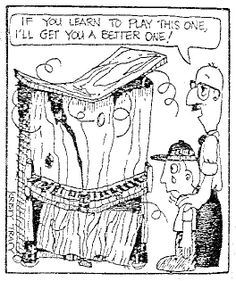
Do you have plans to buy a used piano?
First of all, we want to congratulate you on taking your first steps towards getting a piano for your home! Buying a quality, previously loved piano is a great way to save money as well as some of our natural resources and the environment.
Investing in a piano can be one of the most pleasurable and rewarding things you can do. It can however be difficult to decide how to go about the purchase process given that it’s such an infrequent event.
Before you buy, we encourage you to do your research so that you know exactly what you’re getting.
1. Buying a piano privately requires research. Although many people play the piano, very few know anything about its mechanism or even how to properly care for this complicated and sensitive instrument. The piano is unlike any other instrument. It is not unusual for musicians who play trumpets, clarinets, flutes etc. to be able to completely dismantle, reassemble and adjust them. Mechanically these are very simple instruments as compared to pianos, which have between 8000 and 12,000 parts. Here are just a few of the many issues that can be encountered when a non-expert piano buyer buys a piano from a private party.
- Plate-may be cracked
- Bass Strings-tired &tubby, devoid of tone
- Soundboard-may be cracked or lost its crown
- Ribs-may have broken away from the soundboard
- Bridges-may have lost proper bearing
- Tuning pins -may be loose
- Pin Block-may be loose
- Action-may be worn out
- Hammers-may be worn out
2. Pianos have moving costs and need regular maintenance. Pianos are expensive to move. They are heavy and require professionals. Strength is not enough! You can harm yourself, damage the instrument and your home.
3. How much to spend. It is definitely possible to spend too little or too much on both your instrument and your music education. You could have one of the finest used pianos ever manufactured. However, if you are learning via YouTube or through a book, your musical journey will never reach the heights it could. Similarly, a used, damaged keyboard combined with the finest music pedagogue will result in the same thing: a poor musical experience. Finding a balance is key.
4. Learning the piano takes time and is a commitment. We all know this but it must be said.
5. Pianos require the proper environment. The piano needs consistent temperature and humidity. It should not be placed in direct sunlight or close to a heating vent or a fireplace. This is universally true as a consideration when buying a new piano, but how do you evaluate a used piano who’s pedigree you do not know? Ask the seller, of course, but an experienced registered piano technician (RPT) can tell you when inspecting it.

6. Getting impartial advice from teachers. Teachers are a great source of information and guidance. They also usually have strong opinions on what is best for the student because of their method of teaching. Some teachers receive commissions or kick-backs from piano stores and as such may be motivated by other factors. Ask them. If this is the case, we must ask “Is the teacher recommending the best piano for the student or what is best for their pocket book?”
Buying a piano can be a little intimidating. Most piano store people are happy to talk to you about used pianos. They can recommend technicians to help you in your search and of course inform you on what used instruments they have in their showroom. Many times a savvy purchaser will research the private piano market and come to the conclusion that a private sale may seem a better deal until they start adding up the cost of the inspection from a piano technician, the piano mover and the tuning and repairs once it is in the home. Additionally, the piano will have no warranty. We wish you the very best on your piano buying journey. Please don’t hesitate to call us!




